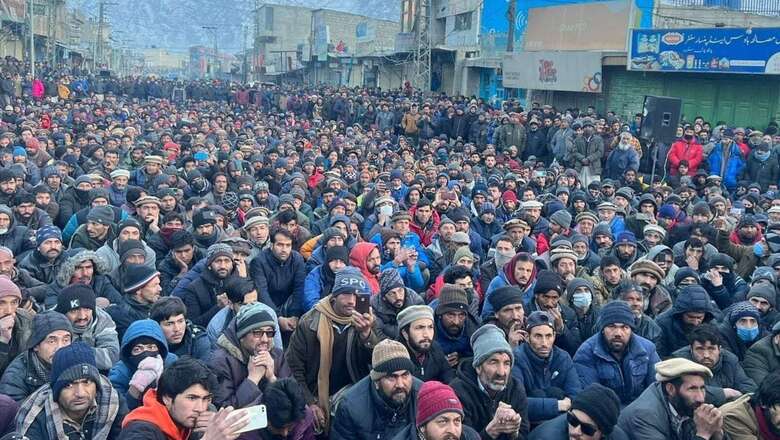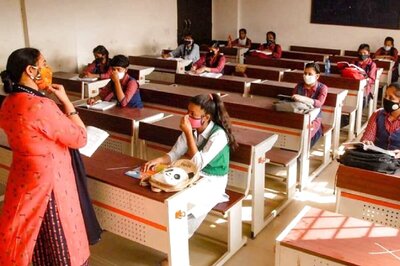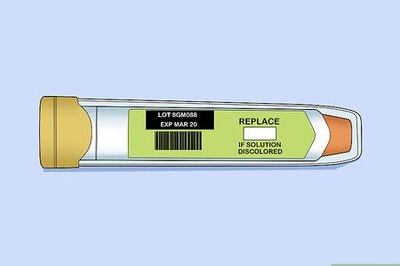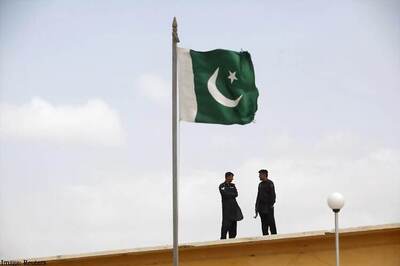
views
In a reprieve for the establishment, the largest public protest in the history of Gilgit-Baltistan in Pakistan-Occupied Kashmir (PoK) ended on Tuesday, with the protesters agreeing to give a month’s time to local representatives to look into the power cuts, land grabbing, illegal taxes and wheat subsidy, misuse of Khalsa Sarkar laws and the teachers’ strike at Toramuk Truck Road, said local sources.
As the stir reached the 11th day, members of civil society held a protest in solidarity on Tuesday. The Gilgit-Baltistan Student Council, meanwhile, organized another protest outside the Karachi Press Club, said local sources.
The Chief Minister of the region, Khalid Khurshid, met the representatives of the Anjuman Tajran Baltistan and sought a month’s time, said local sources.
گلگت:وزیر اعلیٰ گلگت بلتستان خالد خورشید کے زیر صدارت محکموں کے عدالتوں میں زیر التواء کیسز اور انصاف کی بروقت فراہمی کے حوالے سے اعلیٰ سطحی اجلاس! pic.twitter.com/WFuyuEjDXK— Muhammad Khalid Khurshid Khan (@AbdulKhalidPTI) January 9, 2023
According to the sources, a member of the action committee said: “We will see the action of the state officials for a few days. If it bears no result, we will consider our next step."
The people feel Gilgit-Baltistan should do away with the colonial system and grant citizens their rights. “If the ruling class and bureaucracy continue the mistake of considering Gilgit-Baltistan as a grazing land, the resistance will intensify," said the protesters, according to sources.
The ANI, quoting a vernacular media outlet Baad-e-Shimal’s report, said the locals have raised concerns over the re-imposition of Gilgit Baltistan Revenue Tax 2022, which was earlier revoked after several discussions between the people and authorities.
ON DECEMBER 28
Local traders and members of various political and social organisations observed a shutters’-down strike on December 28 in different parts of Gilgit-Baltistan, with markets closed and vehicles off the roads. Most of these demonstrations were held in Skardu, Gilgit, Hunza and Ghizer.
Pakistan has been misusing the ‘Khalsa Sarkar’ laws for land-grabbing in the region, the report claimed, adding the law states that the federal government could claim ‘ownership of barren or uncultivated land’ in Gilgit-Baltistan, even if it was collectively owned by the local community.
#POJK & #Gilgit_Baltistan have been continuously exploited & suppressed by #Pakistan since 1947. We are voiceless ppl with no basic freedoms. We must be given representation in #JammuAndKashmir legislature to help us raise our voice. If you agree, plz retweet & support our cause. pic.twitter.com/LUPosyl49c— Prof. Sajjad Raja (@NEP_JKGBL) January 8, 2023
The Pamir Times tweeted on December 30 tweeted, “Massive protest demonstrations held in different parts of #Gilgit-#Baltistan yesterday against the “Khalsa Sarkar" colonial law, imposition of taxes and the wheat and power crisis."
The chairman of National Equality Party Jammu Kashmir Gilgit Baltistan and Ladakh (NEP JKGBL) tweeted: “Ppl of #GilgitBaltistan protest for the 8thconsecutive day at Yaadgaar #Skardu against #Pakistan on the issues of illegal land occupation, cutting subsidies, increasing electricity prices, black laws & imposing unfair taxes. #Pakistani govt & media have closed their eyes & ears."
According to a fact-finding report by Human Rights Commission of Pakistan last year, the Khalsa Sarkar system violated international human rights standards, including the ‘UN Declaration of the Rights of Indigenous Peoples’, which protects indigenous peoples’ rights to their collective bio-cultural heritage as a whole, including traditional knowledge and resources, territories, and cultural and spiritual values and customary laws.
With ANI Inputs
Read all the Latest News here




















Comments
0 comment